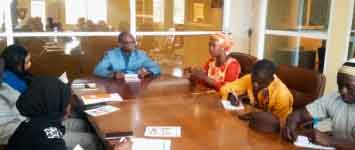By Samsideen Ceesay
The National Early Warning Responsive Mechanism Coordinating Centre (NCCRM) under the Office of The Vice President recently paid a courtesy call on the Ministry of Gender, Children and Social Welfare.
Officials say the visit was to present the centre’s mission to the Ministry in terms of acquiring quality and timely data, to produce accurate information and monitor and evaluate the usage of the information in decision-making, to identify and forecast emerging crises in The Gambia and West Africa and to prepare risk assessments, evaluations and recommendations for response to national and regional authorities.
The ECOWAS Early Warning and Responsive Mechanism is to have in place a fully integrated and functional system, providing The Gambia and ECOWAS Commission with timely reports and analysis to enable effective response in preventing and mitigating violence.
However, gender being a cross-cutting issue, has a direct link and bearing on the promotion of peace and human security agenda since hazards such as land disputes, air pollution, food insecurity, water management, terror financing, violence (Sexual Gender Based Violence) are all global, regional and national concerns.
In his welcome address, Saikou K Sanyang, the Permanent Secretary at the Ministry of Gender, Children and Social Welfare expressed gratitude at hosting the team and assured them of the ministry’s unflinching support towards the success of their mission.
He assured of the Ministry’s collaboration with the centre towards the advancement, promotion and protection of women, children and vulnerable groups in the country.
Momodou Senghore, the environment and climate change specialist at the National Early Warning Centre, elucidated that part of their mission is to identify and access data on climate change stress, land tenure issues and sanitation.
He affirmed that part of their work is to collaborate with relevant public institutions in matters relating to human security, to collect timely relevant and accurate data on the environment, climate change, health, security governance and human right and advise government on issues that might affect or impede the security of the nation.
The activity was characterised by discussions relating to possible areas of collaboration, information sharing and data management.







